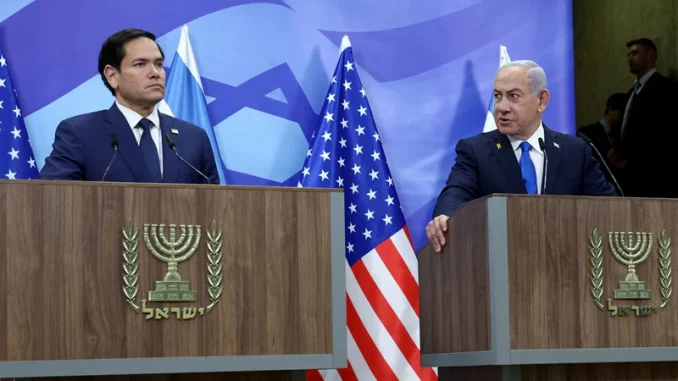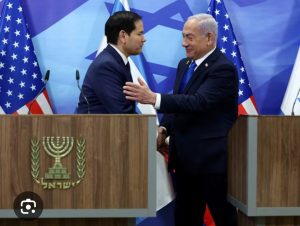
NEWSMAX | Published February 16, 2025
Israel and the United States have a common approach to Gaza, Israeli Prime Minister Benjamin Netanyahu said, praising President Donald Trump’s “bold vision” for the territory after talks Sunday with U.S. Secretary of State Marco Rubio.
Rubio on Sunday fully endorsed Israel’s war aims in the Gaza Strip, saying Hamas “must be eradicated” and throwing the future of the shaky ceasefire into further doubt.
Rubio met with Netanyahu in Jerusalem at the start of a regional tour, where he is likely to face pushback from Arab leaders over President Donald Trump’s proposal to transfer the Palestinian population out of the Gaza Strip and redevelop it under U.S. ownership.
Netanyahu has welcomed the plan, and said he and Trump have a “common strategy” for Gaza’s future. Echoing Trump, he said “the gates of hell would be open” if Hamas does not release dozens of remaining hostages abducted in its Oct. 7, 2023, attack that triggered the war.
Their remarks came just two weeks before the first phase of the ceasefire is set to end. The second phase, in which Hamas is to release dozens of remaining hostages in exchange for more Palestinian prisoners, a lasting truce and the withdrawal of Israeli forces, has yet to be negotiated.
Rubio said Hamas “cannot continue as a military or government force.”
“As long as it stands as a force that can govern or as a force that can administer or as a force that can threaten by use of violence, peace becomes impossible,” Rubio said. “It must be eradicated.”
Such language could complicate efforts to continue talks with Hamas, which, despite suffering heavy losses in the war, remains intact and in control of Gaza.
The Israeli military meanwhile said it carried out an airstrike early Sunday on people who approached its forces in southern Gaza. The Hamas-run Interior Ministry said the strike killed three of its policemen while they were securing the entry of aid trucks near Rafah, on the Egyptian border.
Hamas said that attack was a “serious violation” of the ceasefire and accused Netanyahu of trying to sabotage the deal.
Resuming the war could be a death sentence for the remaining hostages and may not succeed in annihilating Hamas, which survived a 15-month Israeli onslaught and quickly reasserted control over Gaza when the ceasefire took hold last month.
Netanyahu has signaled readiness to resume the war after the current stage and has offered Hamas a chance to surrender and send its top leaders into exile. Hamas has rejected such a scenario.
Netanyahu also has yet to approve the entry of mobile homes and heavy machinery into the Gaza Strip, as required by the ceasefire agreement.
Hamas had threatened to hold up the release of hostages last week over the issue, raising fears the ceasefire could unravel, before proceeding with the release of three captives based on what it said were assurances from Arab mediators.
An Israeli official, speaking on condition of anonymity in line with regulations, said the issue would be discussed in the coming days and that Israel was coordinating with the United States.
In another sign of the two allies closing ranks, Israel’s Defense Ministry said it received a shipment of 2,000-pound (900-kilogram) MK-84 munitions from the United States. The Biden administration had paused a shipment of such bombs last year over concerns about civilian casualties in Gaza.
In a radio interview last week, Rubio indicated that Trump’s proposal was in part aimed at pressuring Arab states to come up with their own postwar plan that would be acceptable to Israel, which says Hamas can have no role in Gaza.
He also appeared to suggest that Arab countries send in troops to combat Hamas.
“If someone has a better plan, and we hope they do, if the Arab countries have a better plan, then that’s great,” Rubio said Thursday on the “Clay and Buck Show.”
But “Hamas has guns,” he added. “Someone has to confront those guys. It’s not going to be American soldiers. And if the countries in the region can’t figure that piece out, then Israel is going to have to do it and then we’re back to where we’ve been.”
Rubio was not scheduled to meet with any Palestinians on his trip.
For Arab leaders, facilitating the mass expulsion of Palestinians or battling Palestinian militants on behalf of Israel are both nightmare scenarios. Either would open them up to fierce domestic criticism and potentially destabilize an already volatile region.
Egypt says it will host an Arab summit on Feb. 27 and is working with other countries on a counterproposal that would allow for Gaza to be rebuilt without removing its population. Human rights groups say the expulsion of Palestinians would likely violate international law.
Egypt has warned that any mass influx of Palestinians from Gaza would undermine its nearly half-century-old peace treaty with Israel, a cornerstone of American influence in the region.
Arab and Muslim countries have until now conditioned any support for postwar Gaza on a return to Palestinian governance with a pathway to statehood in Gaza, the West Bank and east Jerusalem, territories Israel seized in the 1967 Mideast war.
The Biden administration spent months rallying regional powers behind such plans, but they fizzled as Israel ruled out not only a Palestinian state but also any role in Gaza for the Western-backed Palestinian Authority, whose forces were driven out when Hamas seized power there in 2007.
Hamas has said it is willing to relinquish power in Gaza but insists on Palestinian rule.
Rubio is also set to visit the United Arab Emirates and Saudi Arabia, regional heavyweights that have rejected any mass displacement of Palestinians and would be key to any regional response.
The United Arab Emirates was the driving force behind the 2020 Abraham Accords in which four Arab states normalized relations with Israel during Trump’s previous term. Trump hopes to expand the accords to include Saudi Arabia, potentially offering closer U.S. defense ties, but the kingdom has said it will not normalize relations with Israel without a pathway to a Palestinian state.
Rubio will not be visiting Egypt or Jordan, close U.S. allies at peace with Israel that have refused to accept any influx of Palestinian refugees. Trump has at times suggested he might slash U.S. aid to the two countries, which could be devastating for their economies, if they don’t comply.
He is also skipping Qatar, which along with Egypt had served as a key mediator with Hamas in brokering the ceasefire.
Trump took credit for the ceasefire, which was reached in the closing days of the Biden administration after his Mideast envoy, Steve Witkoff, joined the talks. But more recently, Trump has suggested that Israel resume the war if the remaining dozens of hostages are not released sooner than planned.
READ FULL ARTICLE
SOURCE: www.newsmax.com
RELATED: As Rubio Visits, Netanyahu Praises Trump’s ‘Bold’ Gaza Vision

BARRON’S | Published February 16, 2025
Israel and the United States have a common approach to Gaza, Israeli Prime Minister Benjamin Netanyahu said, praising President Donald Trump’s “bold vision” for the territory after talks Sunday with US Secretary of State Marco Rubio.
Washington’s top diplomat is on his first visit to the Middle East, a trip that comes after Trump made a widely-condemned proposal to take control of Gaza and relocate its more than two million residents.
“We discussed Trump’s bold vision for Gaza’s future and will work to ensure that vision becomes a reality,” Netanyahu told reporters after their meeting, adding that the two leaders had a “common strategy” for the future of the war-ravaged Palestinian territory.
The scheme that Trump outlined earlier this month, while Netanyahu visited Washington, lacked details. Trump said Palestinians had “lived a miserable existence” in Gaza and suggested the coastal territory could become the “Riviera of the Middle East”, following redevelopment after more than 15 months of war.
Though Netanyahu welcomed the idea, foreign leaders have largely rejected it.
Netanyahu warned Israel would “open the gates of hell” in Gaza unless all hostages were returned, echoing Trump, who said “hell” would break out if Hamas failed to release them.
Rubio arrived hours after Hamas freed three Israeli hostages in Gaza in exchange for 369 Palestinian prisoners — the sixth swap under a fragile ceasefire which the United States helped mediate along with Qatar and Egypt.
“At any moment the fighting could resume. We hope that the calm will continue and that Egypt will pressure Israel to prevent them from restarting the war and displacing people,” said Nasser al-Astal, 62, a retired teacher in southern Gaza’s Khan Yunis.
Washington, Israel’s top ally and weapons supplier, has said it is open to alternative proposals from Arab governments but insists that, for now, “the only plan is Trump’s”.
Egyptian President Abdel Fattah al-Sisi on Sunday said the establishment of a Palestinian state is “the only guarantee” of lasting Middle East peace.
Rubio is due to also visit Saudi Arabia and the United Arab Emirates.
Overnight, Israel said it received a shipment of US-made bombs, after the previous Biden administration blocked a shipment of heavy 2,000-pound ordnance.
Hamas and Israel are implementing the first, 42-day phase of the ceasefire that began on January 19 but nearly collapsed last week.
Israel had warned Hamas it must free three living hostages by the weekend or face renewed fighting.
The freed hostages — Israeli-American Sagui Dekel-Chen, 36, Israeli-Russian Sasha Trupanov, 29, and Israeli-Argentine Yair Horn, 46 — returned to emotional family reunions.
Flanked by armed and masked Hamas fighters on a stage, they had to undergo a last-minute ordeal of speaking in front of the crowds as the militants staged a show of force.
Israel freed 369 Palestinian prisoners, mostly Gazans detained during the war, but also some serving life sentences for attacks on Israelis.
Footage aired by Israeli media showed Palestinian prisoners in sweatshirts bearing a Star of David and the slogan: “We will not forget and we will not forgive.”
They tore them off upon reaching Gaza and burned them in a bonfire at the reception point in Khan Yunis.
Since the truce began last month, 19 Israeli hostages have been released in exchange for more than 1,000 Palestinian prisoners.
Out of 251 people seized in Hamas’s October 7, 2023 attack on Israel that sparked the war, 70 remain in Gaza, including 35 the Israeli military says are dead.
Negotiations on a second phase of the truce, aimed at securing a more lasting end to the war, could begin this week in Doha, a Hamas official and another source familiar with the talks have said.
Trump has warned of repercussions for neighbouring Egypt and Jordan unless they accept displaced Gazans under his plan.
Diplomats say Egypt is leading efforts to propose an alternative focused on training a new security force and appointing local Palestinian leaders.
Rubio has said he believed Arab states were “working in good faith”.
On Sunday, speaking alongside Netanyahu, he said: “Hamas cannot continue as a military or a government force… they must be eliminated.”
The October 7, 2023 attack on Israel resulted in the deaths of 1,211 people, mostly civilians, according to an AFP tally of Israeli official figures.
Israel’s retaliatory campaign has killed at least 48,264 people in Gaza, the majority of them civilians, according to figures from the health ministry in the Hamas-run territory that the United Nations considers reliable.
On Sunday, Hamas said an Israeli air strike killed three police officers near south Gaza’s Rafah. Israel said it struck “several armed individuals” in south Gaza.
It is at least the second Israeli air strike in Gaza since the ceasefire began.


Be the first to comment